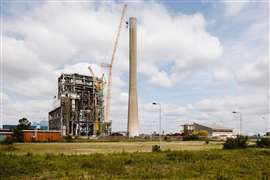Read this article in Français Deutsch Italiano Português Español
Can standardised data transform the construction industry’s approach to carbon assessment?
12 February 2024
In recent years, the construction industry has faced increasing pressure to adopt greener practices and to achieve net zero carbon emissions targets by 2050. Antony Brophy, UK Director of Business Development at Cobuilder takes a deep look at the construction industry’s approach to carbon measurement.
However, despite this growing demand for sustainability, the industry continues to grapple with legislative uncertainties and a lack of accurate data for the continuous measurement of construction materials throughout their lifecycle.
 Standardised data allows anyone involved in a construction project to be able to see all the properties that make up building materials (Photo: AdobeStock)
Standardised data allows anyone involved in a construction project to be able to see all the properties that make up building materials (Photo: AdobeStock)
One area of difficulty is the ongoing debate around the reform of Energy Performance Certificates (EPCs). While legally valid, these documents are criticised by industry professionals for their inaccuracy and oversimplified energy efficiency ratings. EPCs rely on predicted or designed performance rather than actual energy usage, providing an incomplete picture of a building’s energy efficiency. The inaccuracy of EPCs – which are heavily relied upon by all those involved in a construction project (from property owners, to builders, to regulatory bodies) - highlights a broader need for common standards and measurement practices to drive investment into energy-efficient buildings.
The Royal Institution of Chartered Surveyors’ (RICS) latest global sustainability report, a comprehensive analysis of green building practices, sheds additional light on the construction industry’s approach to carbon measurement.
Looking for solutions
The RICS report identifies several key areas that urgently need to be addressed. One of these is that a third of industry professionals regard the lack of common standards as a significant obstacle to investment. Another is that industry stakeholders must be able to comprehend the scope of carbon emissions if they are to manage and measure them effectively.
To address the challenges outlined in the report, RICS proposes three key points for the construction sector: increased focus on education and qualifications, aligning carbon pricing with other policies (such as those focusing on energy efficiency and minimum energy performance standards), and an emphasis on improving circular economy practices through digitalisation.
Among these, digitalisation emerges as a notable solution, especially when considering the benefits of standardised data. Digital tools can help professionals collect, store, and share crucial information about materials and products. Technical characteristics of specific building components and other relevant data can be recorded using building information modelling (BIM).
Standardised data as a solution
Standardised data allows anyone involved in a construction project to be able to see all the properties that make up building materials (such as a window, for example), including the generic properties (height, width and volume), as well as its environmental properties such as energy use and carbon footprint.
 A key advantage of standardised data is its accurate and continuous measurement of construction materials throughout their lifecycle (Photo: AdobeStock)
A key advantage of standardised data is its accurate and continuous measurement of construction materials throughout their lifecycle (Photo: AdobeStock)
A key advantage of standardised data is its accurate and continuous measurement of construction materials throughout their lifecycle. To understand the carbon emissions from a specific material or product throughout its lifecycle, measurement needs to start right from the point of specification for building materials through to their design, purchasing, manufacturing, distribution, and installation.
Industry-led data dictionaries, such as Define, play a pivotal role in facilitating this measurement by implementing these standardised data formats – this creates a ‘single source of truth’, a concept that is used to ensure that everyone involved in a construction project bases decisions on the same data.
Standardised data templates also present a straightforward means to exchange information around all of the products and materials used in a project. They provide a framework within which to agree an approach to recording the defining characteristics of products and materials, according to both international and European data standards.
Ultimately, this simplifies the comparison of products for those involved in a construction project whilst also ensuring that the measurement is accurate, helping the construction industry to meet carbon neutrality targets.
As the construction industry strives for greener practices and net zero carbon emissions, standardised data will be crucial. The insights from the RICS report underscore the urgency of adopting common standards to overcome legislative uncertainties and enhance the accuracy of carbon measurement. By leveraging digital tools and embracing standardised data practices, the industry can pave the way for a more sustainable and transparent future.

About the author
Antony Brophy has over 26 years of experience within the construction and building services industry, digital technologies, 3D, CAD and Building Information Modelling (BIM) management. In his role, he is responsible for empowering Cobuilder’s partners to grow their business through standard-based digital data solutions.
STAY CONNECTED


Receive the information you need when you need it through our world-leading magazines, newsletters and daily briefings.
CONNECT WITH THE TEAM











